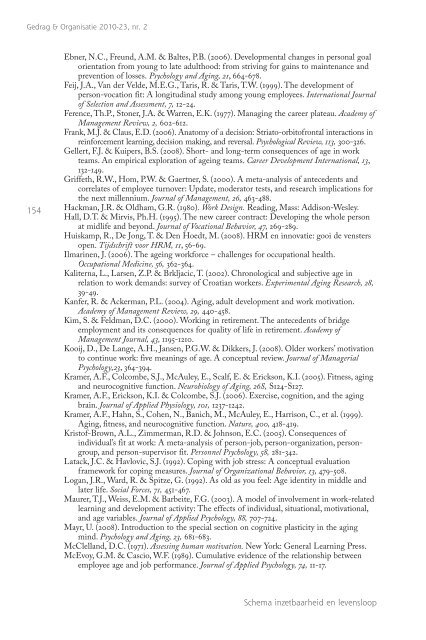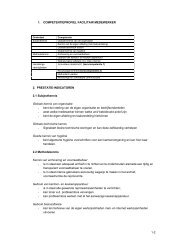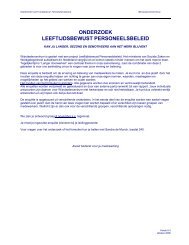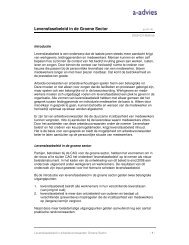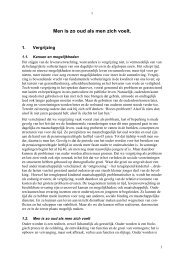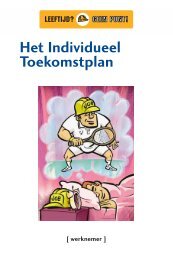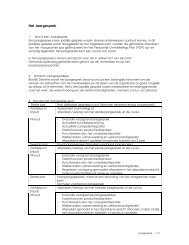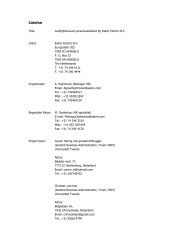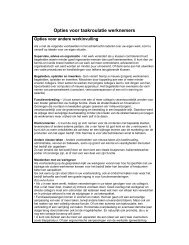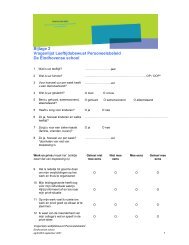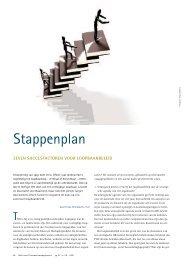Lang zullen ze leven, werken en leren - Leeftijd op het werk
Lang zullen ze leven, werken en leren - Leeftijd op het werk
Lang zullen ze leven, werken en leren - Leeftijd op het werk
You also want an ePaper? Increase the reach of your titles
YUMPU automatically turns print PDFs into web optimized ePapers that Google loves.
Gedrag & Organisatie 2010-23, nr. 2<br />
154<br />
Ebner, N.C., Freund, A.M. & Baltes, P.B. (2006). Devel<strong>op</strong>m<strong>en</strong>tal changes in personal goal<br />
ori<strong>en</strong>tation from young to late adulthood: from striving for gains to maint<strong>en</strong>ance and<br />
prev<strong>en</strong>tion of losses. Psychology and Aging, 21, 664-678.<br />
Feij, J.A., Van der Velde, M.E.G., Taris, R. & Taris, T.W. (1999). The devel<strong>op</strong>m<strong>en</strong>t of<br />
person-vocation fit: A longitudinal study among young employees. International Journal<br />
of Selection and Assessm<strong>en</strong>t, 7, 12-24.<br />
Fer<strong>en</strong>ce, Th.P., Stoner, J.A. & Warr<strong>en</strong>, E.K. (1977). Managing the career plateau. Academy of<br />
Managem<strong>en</strong>t Review, 2, 602-612.<br />
Frank, M.J. & Claus, E.D. (2006). Anatomy of a decision: Striato-orbitofrontal interactions in<br />
reinforcem<strong>en</strong>t learning, decision making, and reversal. Psychological Review, 113, 300-326.<br />
Gellert, F.J. & Kuipers, B.S. (2008). Short- and long-term consequ<strong>en</strong>ces of age in work<br />
teams. An empirical exploration of ageing teams. Career Devel<strong>op</strong>m<strong>en</strong>t International, 13,<br />
132-149.<br />
Griffeth, R.W., Hom, P.W. & Gaertner, S. (2000). A meta-analysis of anteced<strong>en</strong>ts and<br />
correlates of employee turnover: Update, moderator tests, and research implications for<br />
the next mill<strong>en</strong>nium. Journal of Managem<strong>en</strong>t, 26, 463-488.<br />
Hackman, J.R. & Oldham, G.R. (1980). Work Design. Reading, Mass: Addison-Wesley.<br />
Hall, D.T. & Mirvis, Ph.H. (1995). The new career contract: Devel<strong>op</strong>ing the whole person<br />
at midlife and beyond. Journal of Vocational Behavior, 47, 269-289.<br />
Huiskamp, R., De Jong, T. & D<strong>en</strong> Hoedt, M. (2008). HRM <strong>en</strong> innovatie: gooi de v<strong>en</strong>sters<br />
<strong>op</strong><strong>en</strong>. Tijdschrift voor HRM, 11, 56-69.<br />
Ilmarin<strong>en</strong>, J. (2006). The ageing workforce – chall<strong>en</strong>ges for occupational health.<br />
Occupational Medicine, 56, 362-364.<br />
Kaliterna, L., Lars<strong>en</strong>, Z.P. & Brkljacic, T. (2002). Chronological and subjective age in<br />
relation to work demands: survey of Croatian workers. Experim<strong>en</strong>tal Aging Research, 28,<br />
39-49.<br />
Kanfer, R. & Ackerman, P.L. (2004). Aging, adult devel<strong>op</strong>m<strong>en</strong>t and work motivation.<br />
Academy of Managem<strong>en</strong>t Review, 29, 440-458.<br />
Kim, S. & Feldman, D.C. (2000). Working in retirem<strong>en</strong>t. The anteced<strong>en</strong>ts of bridge<br />
employm<strong>en</strong>t and its consequ<strong>en</strong>ces for quality of life in retirem<strong>en</strong>t. Academy of<br />
Managem<strong>en</strong>t Journal, 43, 1195-1210.<br />
Kooij, D., De <strong>Lang</strong>e, A.H., Jans<strong>en</strong>, P.G.W. & Dikkers, J. (2008). Older workers’ motivation<br />
to continue work: five meanings of age. A conceptual review. Journal of Managerial<br />
Psychology,23, 364-394.<br />
Kramer, A.F., Colcombe, S.J., McAuley, E., Scalf, E. & Erickson, K.I. (2005). Fitness, aging<br />
and neurocognitive function. Neurobiology of Aging, 26S, S124-S127.<br />
Kramer, A.F., Erickson, K.I. & Colcombe, S.J. (2006). Exercise, cognition, and the aging<br />
brain. Journal of Applied Physiology, 101, 1237-1242.<br />
Kramer, A.F., Hahn, S., Coh<strong>en</strong>, N., Banich, M., McAuley, E., Harrison, C., et al. (1999).<br />
Aging, fitness, and neurocognitive function. Nature, 400, 418-419.<br />
Kristof-Brown, A.L., Zimmerman, R.D. & Johnson, E.C. (2005). Consequ<strong>en</strong>ces of<br />
individual’s fit at work: A meta-analysis of person-job, person-organization, persongroup,<br />
and person-supervisor fit. Personnel Psychology, 58, 281-342.<br />
Latack, J.C. & Havlovic, S.J. (1992). C<strong>op</strong>ing with job stress: A conceptual evaluation<br />
framework for c<strong>op</strong>ing measures. Journal of Organizational Behavior, 13, 479-508.<br />
Logan, J.R., Ward, R. & Spit<strong>ze</strong>, G. (1992). As old as you feel: Age id<strong>en</strong>tity in middle and<br />
later life. Social Forces, 71, 451-467.<br />
Maurer, T.J., Weiss, E.M. & Barbeite, F.G. (2003). A model of involvem<strong>en</strong>t in work-related<br />
learning and devel<strong>op</strong>m<strong>en</strong>t activity: The effects of individual, situational, motivational,<br />
and age variables. Journal of Applied Psychology, 88, 707-724.<br />
Mayr, U. (2008). Introduction to the special section on cognitive plasticity in the aging<br />
mind. Psychology and Aging, 23, 681-683.<br />
McClelland, D.C. (1971). Assessing human motivation. New York: G<strong>en</strong>eral Learning Press.<br />
McEvoy, G.M. & Cascio, W.F. (1989). Cumulative evid<strong>en</strong>ce of the relationship betwe<strong>en</strong><br />
employee age and job performance. Journal of Applied Psychology, 74, 11-17.<br />
Schema in<strong>ze</strong>tbaarheid <strong>en</strong> <strong>lev<strong>en</strong></strong>slo<strong>op</strong>


